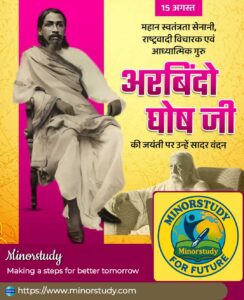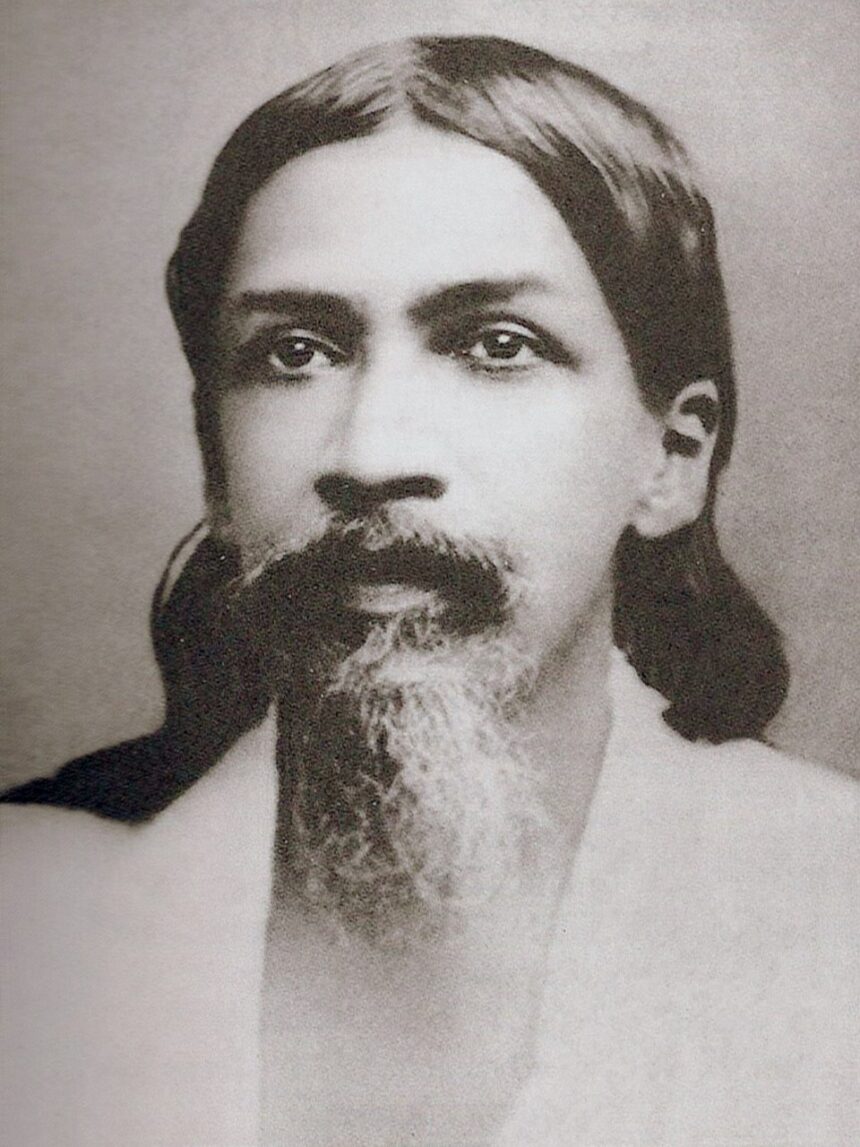Aurobindo Ghosh – From Revolutionary to Spiritual Visionary
Introduction
In the grand story of India’s freedom struggle and spiritual awakening, Aurobindo Ghosh stands as a rare figure who seamlessly merged political courage with spiritual wisdom. He began as a revolutionary voice against British rule, only to later guide humanity toward inner freedom through his philosophy of Integral Yoga.
His life shows that true liberation is both external and internal—a lesson just as relevant in today’s fast-paced, distracted world.
History & Early Life
Aurobindo Ghosh was born on 15 August 1872 in Calcutta into an educated Bengali Kayastha family. At age seven, his father sent him to England for an entirely Western education. There, young Aurobindo studied at St. Paul’s School in London and King’s College, Cambridge, mastering Greek, Latin, and European thought.
In 1893, he returned to India and took up administrative and teaching posts in Baroda. Gradually, his attention turned to India’s growing unrest under colonial rule.
By the early 1900s, Aurobindo emerged as a bold leader of the nationalist movement, editing the revolutionary paper Bande Mataram and inspiring youth to demand complete independence—years before it became mainstream.
His arrest in the Alipore Conspiracy Case (1908–1909) was a turning point. In prison, he experienced profound spiritual visions. Upon release, he withdrew from active politics and moved to Pondicherry in 1910, devoting himself to spiritual practice and teaching.
Noteworthy Facts About Aurobindo Ghosh
Dual Legacy – Freedom fighter and spiritual teacher in equal measure.
Father of Integral Yoga – A holistic spiritual path aimed at transforming human nature.
Ashram Founder – Established the Sri Aurobindo Ashram in 1926 with Mira Alfassa, “The Mother.”
Epic Poet – Authored Savitri, one of the longest epic poems in the English language.
Visionary of Human Evolution – Believed humanity is evolving toward a higher consciousness.
Global Influence – His ideas resonate in both East and West.
Nobel Prize Nominee – Considered for Literature (1943) and Peace (1950).
Educational Reformer – Advocated for Integral Education blending physical, mental, and spiritual growth.
Cultural Bridge – Merged Indian spirituality with Western thought.
Legacy of Auroville – Inspired the creation of Auroville, an international township for human unity.

Timeline of Major Events
| Year | Event |
|---|---|
| 1872 | Born in Calcutta on 15 August. |
| 1879 | Sent to England for schooling. |
| 1893 | Returns to India; joins Baroda State service. |
| 1905–08 | Becomes a prominent nationalist leader. |
| 1908 | Arrested in Alipore Conspiracy Case; spiritual transformation begins. |
| 1910 | Moves to Pondicherry for spiritual work. |
| 1926 | Founding of Sri Aurobindo Ashram. |
| 1943 | Nominated for Nobel Prize in Literature. |
| 1950 | Passes away on 5 December. |
Significance
Aurobindo Ghosh’s significance lies in his ability to connect two seemingly opposite paths: the passionate activism of a freedom fighter and the serene vision of a yogi.
In the freedom movement, he was one of the first leaders to openly demand Purna Swaraj (complete independence).
In spiritual life, he pioneered Integral Yoga, which does not renounce life but transforms it.
In education, he promoted a system that develops the body, mind, heart, and soul in harmony.
His philosophy shows that politics without ethics is hollow, and spirituality without action is incomplete.
Observance & Wishing
Aurobindo Ghosh’s birth anniversary, 15 August, is celebrated at the Sri Aurobindo Ashram in Pondicherry with meditation, readings from his works, and quiet reflection. Devotees worldwide mark the day with prayers, talks, and study circles.
Sample Wishes:
“May Sri Aurobindo’s vision of human unity and divine consciousness guide you always.”
“On this day, let us honor the freedom fighter who became a spiritual light for the world.”
“Wishing you peace, purpose, and progress inspired by Sri Aurobindo’s teachings.”
Importance in Our Life
Aurobindo’s teachings are more than historical artifacts—they offer practical tools for modern living:
Mindfulness in Action – His Integral Yoga teaches that work itself can be a spiritual offering.
Balanced Growth – Encourages development of physical, mental, emotional, and spiritual dimensions.
Purposeful Living – Reminds us that life has a higher aim beyond material success.
Resilience – His own journey from political storms to inner peace inspires endurance in our struggles.
Daily Life Impacts
Applying Aurobindo’s ideas can change how we work, relate, and think:
In Work: Focus on excellence as a service to the divine.
In Relationships: Approach others with empathy and a spirit of unity.
In Self-Care: Develop the body through discipline, the mind through study, and the spirit through reflection.
In Society: Act with integrity, seeing social progress as part of human evolution.
Importance to Society
Ethical Politics – His blend of spirituality and activism offers a model for leaders.
Educational Reform – His Integral Education system can address the current gap between academic achievement and character building.
Global Harmony – His vision of human unity is a counterpoint to divisive politics.
Cultural Preservation – His writings keep alive India’s philosophical richness while engaging with modern thought.
FAQs
Q1: Who was Aurobindo Ghosh?
A freedom fighter, philosopher, poet, and spiritual master who founded Integral Yoga.
Q2: What is Integral Yoga?
A holistic path that seeks to transform all aspects of human life to reflect divine consciousness.
Q3: What did he write?
Major works include The Life Divine, Synthesis of Yoga, and Savitri.
Q4: How did he influence the freedom struggle?
Through leadership, writing, and inspiring youth to demand complete independence.
Q5: Why is he important today?
His ideas on unity, conscious evolution, and ethical action are timeless solutions to modern challenges.
Important Points to Remember
Born 15 August 1872, shares birthday with India’s Independence Day.
One of the earliest leaders to demand complete independence.
Founded Sri Aurobindo Ashram and developed Integral Yoga.
Believed spirituality should transform, not reject, worldly life.
Inspired Auroville, a living experiment in human unity.
Conclusion
Aurobindo Ghosh’s life is a testament to the fact that freedom begins within. His journey from political revolution to spiritual evolution teaches us that the greatest change happens when we align action with inner truth.
In our daily life, his vision urges us to live purposefully, balance our growth, and contribute to the collective progress of humanity. In society, his legacy remains a guiding light for ethical leadership, holistic education, and global harmony.
As he once said, “The Spirit shall look out through Matter’s gaze, and Matter shall reveal the Spirit’s face.”
May we all work toward that vision—in ourselves, in our communities, and in the world.








